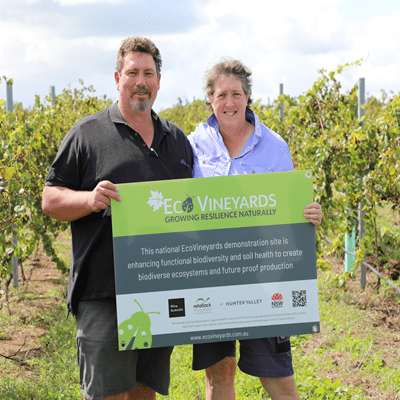Tell us in a few sentences about your experience as a viticulturist, how did you arrive here?
I have wanted to be in the wine industry from my earliest memories, originally it was to be a winemaker, fast forwarding to being accepted to study at Roseworthy Agricultural college for the Oenology Science Degree, back 1990, I deferred for a year and then started my studies in 1991. Once I started the first year and commenced a common subject for the Oenologists and Viticulturists, I decided that to be a good winemaker I needed to understand the reasons for getting good or bad fruit and I switched to the Viti. My parents were involved in the wine industry through my father, Ian, completing the Oenology degree at Roseworthy Ag, through several winemaking jobs in the Barossa and then the Hunter Valley, Mum and Dad started Scarborough Wine Co in 1984, first vintage was in 1987. After travelling Australia working in various viticultural roles including Vineyard Manager at Lindeman’s Hunter Valley from 1996 to 2000, I returned to the family business as General Manager. I became Winemaker/Viticulturist in 2005 and have worked in the family business across a variety of roles ever since.
Why did you decide to apply to be an EcoGrower, was there something specific that influenced your decision and/or had you attended a previous EcoVineyards session?
I have watched the growth of EcoVineyards over recent years via social media and the philosophy and ideas match in with what Scarborough Wine Co was trying to put in place with the Sustainable Wine Australia program.
Has there been a defining moment or catalyst for you to move towards more ecologically driven viticultural practices?
The starting point was in 1996 spending several days with Jon Rasic doing soil surveys in the then Lindemans Wines Hunter Valley Vineyards and his thoughts on organic matter.
Can you provide a brief overview of your project ideas, and what you wish to achieve over the 3 years and why is this important to you?
Looking at undervine mulching in combination with undervine cover crops. Looking at reduced herbicide inputs, increase biodiversity and organic matter undervine and better vine resilience.
Are you just starting to learn, or have you been enhancing biodiversity on your property and is this an extension of what you are currently doing?
This project is an extension of current vineyard management programmes. We have worked to increase mid row biodiversity and organic matter, now it is time to see if we can do it undervine.
Tell us about your hidden superpowers, something that others don’t know about you or a practice you would like to champion?
Inclusion in the Wine Industry.
Where do you see grape growing in the future, do you feel there is an urgency to change current practices? If so, why?
We need to be looking at our social license to operate and how we stay ahead of community expectations by setting them.
What else would you like to share with the broader EcoVineyards community, what gets you excited about the future?
Having just done a quick trip through Europe and their vineyards, I’m excited by the unrestricted access and ability to put in place new ideas in the Australian vineyards and wine industry.

